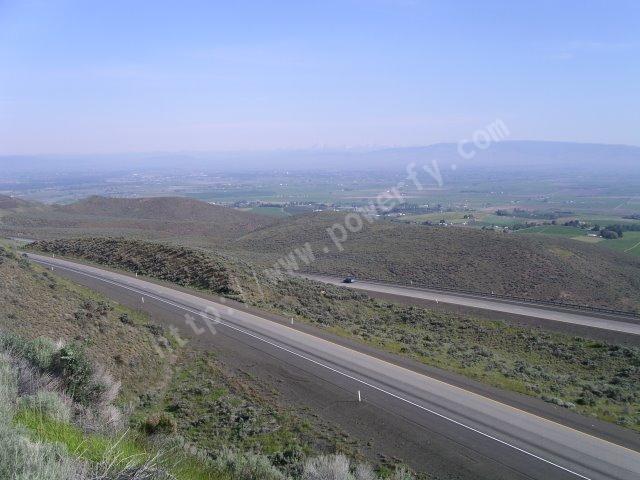Stay safe when on vacation
Look below for tips on eating and drinking while in the car or on long trips, or when eating out of your RV.Handling Food Safely on the Road
During the summer months, most people take to the road in cars or recreational vehicles; live on boats; relax in beach or mountain vacation homes; and camp.
No matter where we go or what we do, there is a common denominator that runs through all of our summer travels and relaxation — it's called FOOD!
The "road" to food safety, however, can either be a bumpy one or smooth — depending on what precautions are taken handling meals as we travel this summer.
The U.S. Department of Agriculture's nationwide, toll-free Meat and Poultry Hotline reminds everyone that some simple, common-sense food safety rules can save a vacation from disaster. Following this advice could make the difference between a vacation to remember and one that is remembered because people got sick from improperly handled food.

First, some general rules, while traveling this summer:
Plan Ahead...
If you are traveling with perishable food, place it in a cooler with ice or freezer packs. When carrying drinks, consider packing them in a separate cooler so the food cooler is not opened frequently. Have plenty of ice or frozen gel-packs on hand before starting to pack food. If you take perishable foods along (for example, meat, poultry, eggs, and salads) for eating on the road or to cook at your vacation spot, plan to keep everything on ice in your cooler.
Pack Safely...
Pack perishable foods directly from the refrigerator or freezer into the cooler. Meat and poultry may be packed while it is still frozen; in that way it stays colder longer. Also, a full cooler will maintain its cold temperatures longer than one that is partially filled. Be sure to keep raw meat and poultry wrapped separately from cooked foods, or foods meant to be eaten raw such as fruits.
If the cooler is only partially filled, pack the remaining space with more ice. For long trips to the shore or the mountains, take along two coolers — one for the day's immediate food needs, such as lunch, drinks or snacks, and the other for perishable foods to be used later in the vacation. Limit the times the cooler is opened. Open and close the lid quickly.
Now, follow these food safety tips:
Food Safety When Camping...
Remember to keep the cooler in a shady spot. Keep it covered with a blanket, tarp or poncho, preferably one that is light in color to reflect heat.Bring along bottled water or other canned or bottled drinks. Always assume that streams and rivers are not safe for drinking. If camping in a remote area, bring along water purification tablets or equipment. These are available at camping supply stores.
Keep hands and all utensils clean when preparing food. Use disposable moist towelettes to clean hands. When planning meals, think about buying and using shelf-stable food to ensure food safety.
REMEMBER!
In hot weather (above 90°F), food should never sit out for more than 1 hour.
Discard any food left out more than 2 hours (1 hour if temperatures are above 90°F).
When Boating...
If boating on vacation, or out for the day, make sure the all-important cooler is along.Don't let perishable food sit out while swimming or fishing. Remember, food sitting out for more than 2 hours is not safe. The time frame is reduced to just 1 hour if the outside temperature is above 90 °F.
Now, about that "catch" of fish — assuming the big one did not get away. For fin fish: scale, gut and clean the fish as soon as they are caught. Wrap both whole and cleaned fish in water-tight plastic and store on ice. Keep 3-4 inches of ice on the bottom of the cooler. Alternate layers of fish and ice. Cook the fish in 1-2 days, or freeze. After cooking, eat within 3-4 days. Make sure the raw fish stays separate from cooked foods.
Crabs, lobsters and other shellfish must be kept alive until cooked. Store in a bushel or laundry basket under wet burlap. Crabs and lobsters are best eaten the day they are caught. Live oysters can keep 7-10 days; mussels and clams, 4-5 days.
Caution: Be aware of the potential dangers of eating raw shellfish. This is especially true for persons with liver disorders or weakened immune systems. However, no one should eat raw shellfish.
When at the Beach
Plan ahead. Take along only the amount of food that can be eaten to avoid having leftovers. If grilling, make sure local ordinances allow it.Bring the cooler! Partially bury it in the sand, cover with blankets, and shade with a beach umbrella.
Bring along disposable moist towelettes for cleaning hands.
If dining along the boardwalk, make sure the food stands frequented look clean, and that hot foods are served hot and cold foods cold. Don't eat anything that has been sitting out in the hot sun for more than 2 hours (1 hour when the temperature is above 90 °F) — a real invitation for foodborne illness and a spoiled vacation.
When in the Vacation Home or the Recreation Vehicle...
If a vacation home or a recreational vehicle has not been used for a while, check leftover canned food from last year. The Meat and Poultry Hotline recommends that canned foods which may have been exposed to freezing and thawing temperatures over the winter be discarded.Also, check the refrigerator. If unplugged from last year, thoroughly clean it before using. Make sure the refrigerator, food preparation areas, and utensils in the vacation home or in the recreational vehicle are thoroughly cleaned with hot soapy water.
The information on this site was produced by the CDC and the USDA and compiled by the site owner. We are not responsible for the accuracy or completeness of this information. Site Design and layout (c) 2007 giantific.com